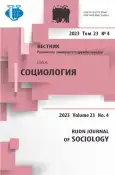Social-cultural features of the suicidal behaviour in Bosnia and Herzegovina
- Authors: Milošević Šošo B.1, Taljanović A.2
-
Affiliations:
- University of East Sarajevo
- University of Sarajevo
- Issue: Vol 23, No 4 (2023)
- Pages: 839-850
- Section: Contemporary society: the urgent issues and prospects for development
- URL: https://journal-vniispk.ru/2313-2272/article/view/322981
- DOI: https://doi.org/10.22363/2313-2272-2023-23-4-839-850
- EDN: https://elibrary.ru/GIQKGH
- ID: 322981
Cite item
Full Text
Abstract
The paper considers specific factors related to suicide and the influence of general, social-cultural factors on suicide in a typical post-war society - Bosnia and Herzegovina (BH). Many researchers focus on the life history of a person that committed suicide in order to get a better understanding of its social-psychological and other factors. However, the authors consider the social-economic factors of suicide based on the survey on social-cultural characteristics of suicide in BH. Part of the sample consisted of respondents that were friends or neighbours of the suicider. BH is a multicultural society that suffered war events not so long ago, which determined social-economic devastation and misery. The consequences are post-traumatic syndrome, high unemployment, social disorders, and social-pathological phenomena, including suicide. In BH, suicide is largely determined by the social circumstances, while certain social-psychological factors seem to be less important (individual pain and suffering caused by accidents or discomforts). Therefore, to understand the causes of increased suicide rates in certain periods and societies, we need to analyse the very nature of the particular society. The suicide rate in BH was considered through the social-cultural determinants of suicide. The ten-year timeframe does not exclude the impact of the previous turbulent period, including a decade of great political turmoil and economic crisis in the post-war society. Thus, the authors studied the statistical data collected by the relevant public institutions and the survey data collected with three questionnaires. Based on that data, the authors analysed in detail the causes of suicide in BH and the effects of specific social-cultural factors in the society trying to overcome the consequences of war after two decades of interethnic conflicts and strong international involvement. By considering the biography, interpersonal relationships, physical and mental health, lifestyle and other aspects of life of the person that committed suicide, the authors identify the most significant risk factors of suicidal behaviour, which may influence a personal decision to commit suicide (including ‘triggers’ and the level of suicidal intent). The social-cultural aspects of suicide prove that this phenomenon has a historical, cultural, religious and global social dimension, which means the need in its multidisciplinary study.
About the authors
B. Milošević Šošo
University of East Sarajevo
Author for correspondence.
Email: milosevic_biljana@yahoo.com
доктор социологии, доцент кафедры социологии East Sarajevo, Bosnia and Herzegovina
A. Taljanović
University of Sarajevo
Email: ataljanovic@fkn.unsa.ba
доктор социологии, профессор факультета уголовного правосудия, криминологии и исследований безопасности Sarajevo, Bosnia and Herzegovina
References
- Adler A. Suicide and Suicidal Ideas, Belgrade; 1984.
- Blauner S.R. How I Survived while My Own Brain Tried to Kill Me. Zagreb; 2005.
- Bošković M. Social Pathology. Novi Sad; 2007.
- Durkheim E. Suicide. Belgrade; 1977.
- Fromm E. Healthy Society. Zagreb; 1984.
- Jugović A. Theory of Social Deviance, Belgrade; 2009.
- Merton R.K. Social structure and anomie. American Sociological Review. 1938; 3 (5).
- Merton R.K. Social Theory and Social Structure. New York; 1965.
- Milisavljević M. Deviations and Society. Belgrade; 2003.
- Milošević B. Household working strategies in the transitional post-war society: On the example of Republic Srpska. Sociological Review. 2011; 45 (2).
- Milošević B., Milovanović I. Socio-cultural capital as the basis of working strategy of the household/family in post-conflict societies: On the example of the Republic Srpska and the North of Kosovo. Studii de Stiinţă şi Cultură. 2005; 10 (2).
- Milošević Šošo B. Deviant Phenomena in the Republic Srpska. East Novo Sarajevo; 2018.
- Milovanović M. Suicide. Belgrade; 1929.
- Narbut N.P., Trotsuk I.V. Serbian post-socialist transition: Notes of the participant observer. RUDN Journal of Sociology. 2018; 18 (1).
- Opalić P. Suicide as an Individual Phenomenon. Suicides in Yugoslavia. Belgrade; 1990.
- Penev G., Stanković B. Suicides in Serbia at the beginning of the 21st century and changes in the past fifty years. Social Thought. 2007; 2.
- Petrović R., Opalić P., Radulović D. Suicides in Yugoslavia. Belgrade; 1990.
- Sinanović Z. Suicide - Individual Choice and (or) Consequence of Crisis. Sarajevo; 2012.
- Stanković B., Penev G. Sociocultural context of suicidal behaviour and some relevant facts about suicides in Serbia. Sociological Review. 2009; 15 (2).
- Taljanović A. Analysis and Interpretation of the Data on the Suicide Rate in BiH from 2005 to 2015. Kiseljak; 2020. No. 2.
- Taljanović A. Suicidal Social Mentality in the Post-War Society of Bosnia and Herzegovina. Kiseljak; 2020. No. 1.
- Telebaković B. The Problem of Freedom. Belgrade; 2008.
- Trotsuk I. Instead of a review; or, what, and thanks to whom, do we know about a man at war? Russian Sociological Survey. 2015; 14 (4).
- Vlajković J. Life crises - prevention and overcoming. Belgrade; 2005.
- WHO: Preventing Suicide: A Global Imperative; 2014.
- WHO: Suicide Prevention (SUPRE); 2007.
Supplementary files









